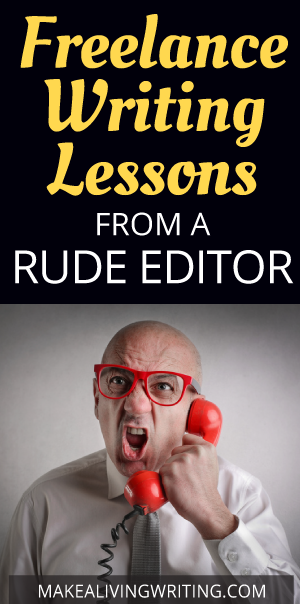
At the time, I had only worked directly with clients. I could meet their goals, but my writing lacked force. I over-wrote, dismissed structure, and indulged my narcissism with unnecessary wit. I wasn’t bad, but I had that collegiate write-everything-you-can-think-of mentality.
My first experience working with a professional editor was heart-wrenching. It was a trial by fire: get better to get paid. But those lessons stuck with me and made me a better writer.
Want to improve your writing?
Avoid making the same mistakes as I did, and check out the seven hardest freelance writing lessons this editor taught me:
1. Stop trying to be clever
Readers rarely appreciate cleverness. They don’t want to decipher your prose or wade through innuendo. They want clarity and few words.
Be absolutely sure your humor is right for your audience. I once wrote “I just can’t even” in a blog post. My my 20 year-old sister laughed, but the readership of grandmothers didn’t understand.
2. The universal structure creates cohesion
“Tell them what you’ll tell them, tell them, then tell them what you told them.”
We all learned the universal structure in primary school: introduction, body and conclusion.
This cohesive format focuses your piece. Your introduction creates expectations, your body satisfies those expectations, and your conclusion reminds the reader how helpful you’ve been.
3. Your mom is not your editor
It’s tempting to use a friend as your editor, especially to keep your costs down. You think, “This topic isn’t hard. My mom/friend/roommate could edit this.”
This is always a mistake.
People close to you make terrible editors because they have an emotional stake in your success. They withhold criticism to spare your feelings.
You need someone who will tell you when your writing is crap.
If your editor is your client, insist they provide heaps of feedback, no matter how much it hurts.
4. Research everything
For one assignment, I referenced a video where a karate competitor performed an impressive kick. I didn’t double check my facts and I referred to the technique by the wrong name.
The client caught my mistake just moments after the article was posted, but my credibility was bruised. This led to a two-week break in my recurring gig while they combed through my previous content for mistakes. I lost money and trust.
Always do your research, especially if you’re writing outside your own discipline (as many freelancers do).
5. Avoid scope creep
The scope of your article includes everything it takes to make your point. Sometimes we push the boundaries of the scope until we’ve included a mess of unnecessary information.
Control the scope by creating a one sentence theme for each article. Any remark that’s three or more sentences removed from your theme doesn’t belong in the piece.
A fantastic point will always seem lame if it’s irrelevant.
6. It will never be perfect
I work with creative teams every day. They all have one thing in common: they never like their own work. All they see are flaws. I cringe when I look at things I wrote just last year.
If you’re a push-to-improve person, you never say “I’m satisfied.” But don’t let that stop you from publishing.
You can be confident with your work when you can answer “yes” to these questions:
• Have I made my point?
• Have I removed anything that doesn’t support my point?
• Have I met my client’s goals?
7. Put your emotions in, then take them out
You have to invest yourself emotionally in your writing. But once the first draft is done, tighten up your feelings because no one cares that you “worked really hard.” Your readers only care about the value you provide.
Banish your sentimentality. Don’t just get editor feedback — learn to crave it, to demand it. The best writers use self-doubt to grow.
Working with an editor was a remarkable experience. As freelancers, we don’t get that luxury often. Hopefully these lessons improve your craft as they did mine.
Dennis Hammer is a writer, designer, and inbound marketing guru. He works at a creative agency in Connecticut where he builds content, social and email marketing campaigns.










